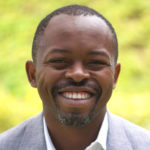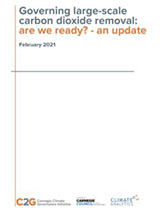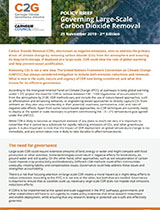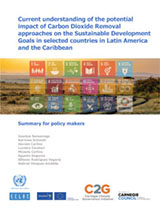C2GDiscuss
From net zero to net negative: policy implications for Carbon Dioxide Removal (CDR)
20 September 2021, UTC 14:00
This discussion was recorded on 8 September 2021, and is also available with interpretation into 中文, Español, and Français.
Current international responses to climate change continue to place the world on a trajectory beyond 1.5°C global warming, with impacts posing severe risks to natural and human systems. Discussions on carbon dioxide removal (CDR) globally has grown since the publication of the IPCC special report on global warming of 1.5°C, which reaffirms that large-scale CDR is required in all of its pathways to limit global warming to 1.5°C, with limited or no overshoot to achieve net-zero mid-century and global net negative emissions thereafter, until the end of the century. By removing between 100 to 1000 billion tonnes of CO2 depending on the speed of emissions reduction in respective pathways.
CDR methods vary and include the use of nature-based approaches, such as afforestation and enhancing wetlands, or engineering-based approaches to directly capture carbon dioxide. At scale, they all present potential benefits and risks of negative side-effects and pose significant governance challenges as many governance gaps exist. Most CDR approaches are currently theoretical and far from being ready to deploy at the speed or scale necessary to prevent overshooting the Paris Agreement temperature goal of 1.5–2°C.
Discussions around CDR governance, in particular on and around nature-based approaches to CDR as well as direct air carbon capture and storage, have more recently gained growing interest in light of the wave of net-zero commitments or pledges by governments, companies and other actors over the last two years.
However, important knowledge gaps persist around the role CDR could play in achieving net negative emissions after net-zero to deliver the Paris Agreement’s goal. This C2GDiscuss features three global experts sharing their views on the role that CDR could play to achieve net negative after net zero. Some of the topics explored in this discussion are: what needs to be done now to have CDR functioning by the time we need it; how can CDR’s full potential be realized as a climate response while making sure that the co-benefits are maximized, and trade-offs minimized in relation to the Sustainable Development Goals (SDGs); what role could the public and private sector play to scale up the required CDR and is there a role for other non-state actors.
Understanding these issues is crucial and urgent for meaningful societal deliberations and decisions today.
Speakers:
Jan Minx, Mercator Research Institute on Global Commons and Climate Change (MCC)

Prof. Minx has contributed substantially to the recent work of the Intergovernmental Panel on Climate Change (IPCC). He is currently a Coordinating Lead Author of the IPCC’s Sixth Assessment Report, where he co-leads the chapter on emission trends and drivers in Working Group III Mitigation of Climate Change. He also played a major role during the fifth assessment cycle, where he coordinated the report process as Head of the Technical Support Unit. Prof. Minx is one of three principal investigators of the ERC-2020-SyG funded project GENIE (Ref: 951542), which has set out to provide a critical assessment of technically feasible, politically acceptable and socially legitimate CO2 removal and climate engineering pathways for Europe over the coming six years.
James Mwangi, Dalberg Group

Since 2014, James has served as Executive Director of the Dalberg Group, supporting the growth of new businesses, and coordinating the efforts of all Dalberg entities in pursuit of a shared mission. In that role he has overseen the acquisition or incubation of 6 businesses that are today integral parts of the Dalberg Group operating from locations in 24 countries around the world and employing over 600 professionals.
James is a 2009 Archbishop Tutu Leadership Fellow of the African Leadership Institute, a 2013 Young Global Leader of the World Economic Forum and a member of the Young Presidents Organization. He currently serves on the boards of the Skoll Foundation, One Acre Fund, Old Mutual and the Nairobi International Financial Centre Authority. He holds a degree in economics from Harvard University.
Shuchi Talati, United States Department of Energy

Dr. Talati was the 2017-2018 AAAS/AIP Congressional Science Fellow in the U.S Senate and served at the White House Office of Science and Technology Policy in the Obama Administration. Dr. Talati has a BS in environmental engineering from Northwestern University, an MA in climate and society from Columbia University, and a PhD from Carnegie Mellon University in engineering and public policy.
Moderator:
Janos Pasztor, Carnegie Climate Governance Initiative

Earlier, he was Acting Executive Director for Conservation (2014), and Policy and Science Director (2012-2014), at WWF International. He directed the UNSG’s Climate Change Support Team (2008-2010) and later was Executive Secretary of the UNSG’s High-level Panel on Global Sustainability (2010-2012). In 2007 he directed the Geneva-based UN Environment Management Group (EMG). During 1993-2006 he worked and over time held many responsibilities at the Climate Change Secretariat (UNFCCC), initially in Geneva and later in Bonn.
His other assignments included: the Secretariat of the UN Conference on Environment and Development (Earth Summit ’92); Stockholm Environment Institute; United Nations Environment Programme (UNEP); Secretariat of the World Commission on Environment and Development (Brundtland Commission); the Beijer Institute; and the World Council of Churches. He has BSc and MSc degrees from the Massachusetts Institute of Technology (MIT).
Highlights:
“Why is it important to consider the role of Carbon Dioxide Removal to achieve net-negative emissions, post net zero now?”
Jan Minx
Mercator Research Institute on Global Commons and Climate Change (MCC)
“What is the role of the public sector in scaling up Carbon Dioxide Removal?”
Shuchi Talati
United States Department of Energy
“Why is a robust accounting framework important in the context of offsets and Carbon Dioxide Removal?”
Shuchi Talati
United States Department of Energy
“How to approach Carbon Dioxide Removal from a Global South perspective and specifically in the African Region?”
James Mwangi
Dalberg Group
“What is the key governance challenge in creating economic opportunities for scaling up Carbon Dioxide Removal?”
James Mwangi
Dalberg Group
“Is a carbon price a silver bullet for Carbon Dioxide Removal Development?”
Jan Minx
Mercator Research Institute on Global Commons and Climate Change (MCC)
“Why do we need to urgently accelerate innovation in scaling up Carbon Dioxide Removal?”
Jan Minx
Mercator Research Institute on Global Commons and Climate Change (MCC)
“Why is an international framework needed to address the transboundary issues related to Carbon Dioxide Removal?”
James Mwangi
Dalberg Group
“Why is public engagment crucial in scaling up Carbon Dioxide Removal?”
Shuchi Talati
United States Department of Energy
Related posts:
Policy Brief: Governing Large-Scale Carbon Dioxide Removal
21 November 2019 – 2nd Edition


